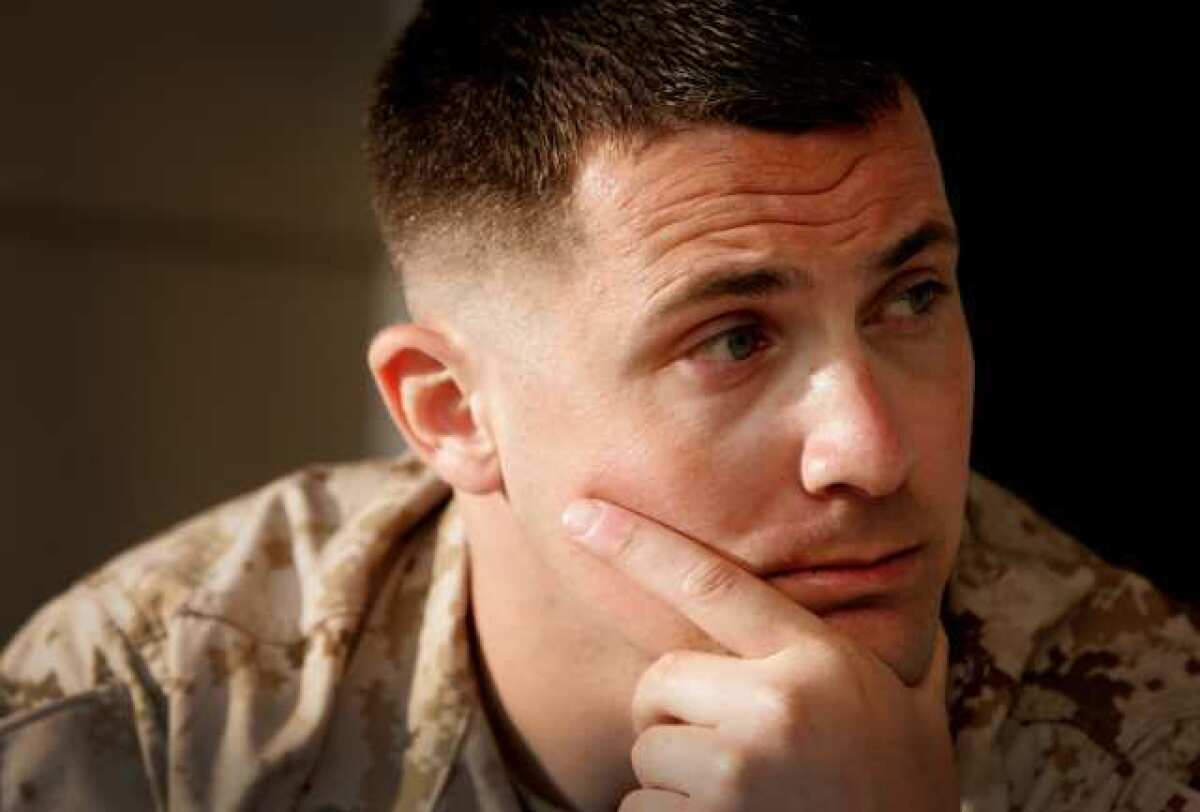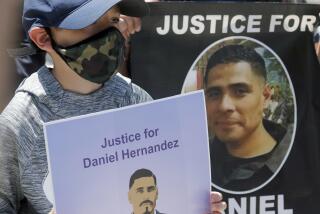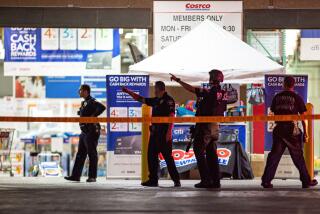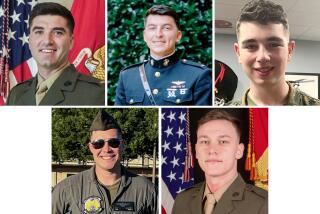Marines, corpsman refuse to testify against sergeant at retrial in Iraqi killing

Marine Sgt. Lawrence Hutchins is being retried at Camp Pendleton in the 2006 killing of an Iraqi. He served six years in prison before his conviction was overturned and the case returned for retrial.
Despite offers of immunity from prosecution, four ex-Marines and a former Navy corpsman have refused to testify against Sgt. Lawrence Hutchins in his retrial in the 2006 killing of an Iraqi.
The five — all of whom were convicted in the killing and served time in the brig — asserted their 5th Amendment right against self-incrimination during the court martial last week at Camp Pendleton.
Hutchins, 31, was the squad leader the night that prosecutors claim the squad dragged a 52-year-old Iraqi from his bed, tied his hands, shot him multiple times and then tried to make the incident look like a firefight.
Hutchins stood over the wounded man and pumped three bullets into his face, which “blew up the back of his skull,” one of the prosecutors, Maj. Samson Newsome, told the six-man jury in his opening statement.
The jury — three officers and three senior enlisted — must decide whether Hutchins should again be convicted of unpremeditated murder and possibly returned to prison for four-plus years.
Convicted in 2007, Hutchins served more than six years of an 11-year prison sentence before his case was overturned on appeal and returned to Camp Pendleton for retrial.
Prosecutors portray Hutchins as the ringleader who convinced his squad to kill an Iraqi in Hamandiya, west of Baghdad, as a warning to others not to plant roadside bombs or cooperate with insurgent snipers.
Hutchins told the squad that they were going to kill “any Iraqi male, because this town is going to get the message,” Newsome told the jury.
A key part of the prosecution’s case was to be testimony by others in the squad that Hutchins devised the scheme and directed squad members in the killing and attempted coverup.
But Hutchins’ attorney, Christopher Oprison, said the squad members’ confessions and later testimony were coerced and falsified by Naval Criminal Investigative Service (NCIS) agents.
“Every single one of them was browbeaten,” Oprison said in his opening statement.
Over Oprison’s objection, the judge ruled that the prosecution could submit as evidence verbatim transcripts of the squad members’ previous testimony.
The five, all represented by lawyers, asserted that they did not want to risk prosecution for perjury if, in testifying, they changed their testimony. They had also refused to talk to prosecutors before the trial, Newsome said.
The prosecution is expected to finish its case Monday. Hutchins is not slated to testify. Bing West, former assistant secretary of Defense and author of books about combat Marines in Iraq and Afghanistan, is listed as a defense witness.
Oprison has argued that the jury must hold the prosecution accountable for problems with the NCIS investigation. “Is it justice they seek or just a conviction?” Oprison said of the government.
Hutchins, he said, is not guilty. In Iraq, he said, Hutchins was doing his job to “destroy the enemy and bring his Marines home alive.”
Under military rules, the jury will vote only once. If at least four members do not vote for conviction, Hutchins is acquitted. If jurors convict Hutchins, they have the option of sentencing him to time served, the remainder of the 11-year sentence or something in between.
As the squad leader, Hutchins received the longest prison sentence of all defendants. None of the others served more than 18 months. All were then discharged from the military — under orders from Navy Secretary Ray Mabus.
More to Read
Start your day right
Sign up for Essential California for news, features and recommendations from the L.A. Times and beyond in your inbox six days a week.
You may occasionally receive promotional content from the Los Angeles Times.






